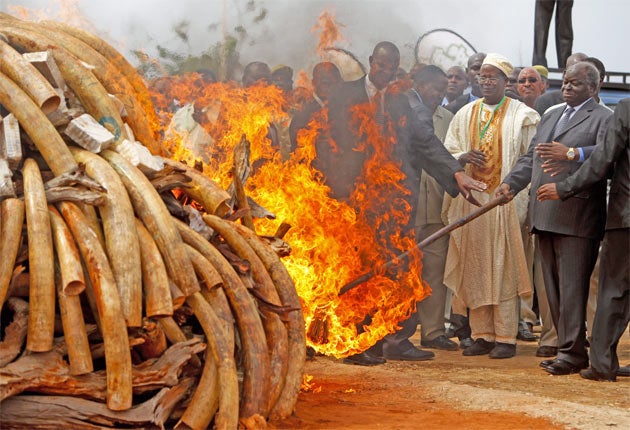Burning of ivory sends a warning to poachers

Your support helps us to tell the story
From reproductive rights to climate change to Big Tech, The Independent is on the ground when the story is developing. Whether it's investigating the financials of Elon Musk's pro-Trump PAC or producing our latest documentary, 'The A Word', which shines a light on the American women fighting for reproductive rights, we know how important it is to parse out the facts from the messaging.
At such a critical moment in US history, we need reporters on the ground. Your donation allows us to keep sending journalists to speak to both sides of the story.
The Independent is trusted by Americans across the entire political spectrum. And unlike many other quality news outlets, we choose not to lock Americans out of our reporting and analysis with paywalls. We believe quality journalism should be available to everyone, paid for by those who can afford it.
Your support makes all the difference.Kenya has publicly burnt elephant ivory worth £10m in an attempt to focus attention on rising poaching deaths.
President Mwai Kibaki personally wielded the torch to light the bonfire of 335 confiscated tusks and 41,000 ivory trinkets.
He told several hundred people gathered at a rural Kenya Wildlife Service training facility: "Through the disposal of contraband ivory, we seek to formally demonstrate to the world our determination to eliminate all forms of illegal trade in ivory.
"We must all appreciate the negative effects of illegal trade to our national economies. We cannot afford to sit back and allow criminal networks to destroy our common future."
Elephant numbers are much healthier today than in the recent past, but conservationists say a second crisis is looming as poachers eek to satisfy China's appetite for ivory.
The conservation charity Save The Elephants tracks news of the animals from around the world, and last week cited headlines reporting elephant-related arrests in Kenya, Namibia and Zimbabwe.
The group's founder, Iain Douglas-Hamilton, said he hoped people would see Kenya's latest ivory destruction as further warning that elephants are again being hunted. The economic loss from the burning was part of the message.
"This is a clear signal that it's worth a lot more money than you could get on the market. We have to stop the buying if we want to stop the killing," he said. "I'm not totally pessimistic. I think the Chinese can be converted."
A global ban on the ivory trade in 1989 briefly halted the elephants' demise. But the ban's initial success has been undermined by booming Asian economies and increasing demand for land. Africa had 1.3 million elephants in the 1970s but has only 500,000 today.
Join our commenting forum
Join thought-provoking conversations, follow other Independent readers and see their replies
Comments